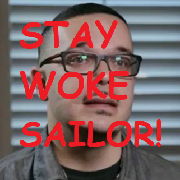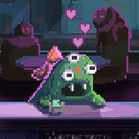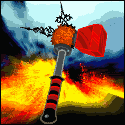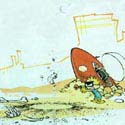|
I don't think DoW has 'no theme' but it certainly lacks conveyance at the extreme. If you even start thinking about the mechanisms of the game for a moment and attempt to play competitively, the game falls apart, especially in terms of the traitor/trading element. It could be rethemed, sure, but there are mechanisms there and anything can be rethemed if you try hard enough. I mean, you could retheme even Dungeon Petz (different types of fish that flow in a canal that you catch with fisherman/traps?) I think Dungeon Petz has higher conveyance than DoW, however, mostly due to the way that the pets act can be unpredictable and you can't ever really expect them to act. It's not about improving assets, since the only asset that you can directly improve is your shop. There are so many things (like, for example, the poop in cages, not being able to shovel it in filled cages etc etc) that really add to this sense of theme as well. I think it would be pretty hard to completely retheme Dungeon Petz and keep everything the same and it is nowhere near as easy as you claim.
|
|
|
|

|
| # ? May 18, 2024 01:28 |
|
I don't understand what you mean by higher conveyance. The traitor exists to cast doubt on the players. If there's no chance of someone intentionally trying to throw the game then you wouldn't need to exile someone, even if they're not actually a bad guy. Is that not fitting of the zombie theme? The request action is intentionally limited as a another means of player tension. If players could freely pass cards and keep them then you're potentially giving someone the game. You all know everyone has a secret agenda so there's no point giving someone an item they may need to win. If players could freely pass cards to add to the crisis then you get a scenario where everyone waits until the last player who can make the determination if the crisis can be passed or not. If Player 1 contributes but none of the other players do then Player 1 is less likely to trust the others. Again, is this not thematic? Again, the fact we're arguing about what's appropriate in Dungeon Petz only shows how contentious theme is to board gamers. The entire game could be about botany, growing plants, properly taking care of them, disposing of pests that accumulate, selling to the highest bidder, seasonal plants are harder to care for than year-round plants and that's why they're worth more, and if nobody buys a plant at market it leaves the game and a fruit or seed is added because "um, it's just a rule." I'm not arguing Dungeon Petz isn't thematic, just that the theme is distant enough that it doesn't turn people away as strongly as Dungeon Lords which I can't imagine as anything else. Or hell, Pax Porfiriana which is so married to its theme that I can't teach it to most people without explaining thematically how destroying your own assets is not only appropriate, it's practically required to win.
|
|
|
|
With enough effort, any game can be rethemed to include zombies, ancient horrors and/or fantasy dungeons. Not too sure about medieval farming, though.
|
|
|
|
nimby posted:With enough effort, any game can be rethemed to include zombies, ancient horrors and/or fantasy dungeons. Not too sure about medieval farming, though. Farm Trucker: race to build farm via crops at the market, then survive a harsh winter of incoming potato blight, roving animals and frost.
|
|
|
|
al-azad posted:I don't understand what you mean by higher conveyance. The traitor exists to cast doubt on the players. If there's no chance of someone intentionally trying to throw the game then you wouldn't need to exile someone, even if they're not actually a bad guy. Is that not fitting of the zombie theme? The request action is intentionally limited as a another means of player tension. If players could freely pass cards and keep them then you're potentially giving someone the game. You all know everyone has a secret agenda so there's no point giving someone an item they may need to win. If players could freely pass cards to add to the crisis then you get a scenario where everyone waits until the last player who can make the determination if the crisis can be passed or not. If Player 1 contributes but none of the other players do then Player 1 is less likely to trust the others. Again, is this not thematic? The problem with DoW is something I said about before. The mechanisms destroy the theme. Why are you hoarding food? -> I need it for my secret objective! Why are you collecting survivors? -> I need it for my secret objective. Why are you not contributing? -> I need these cards for my secret objective. Everything is diverted to that, the fact that you know that they have some secondary objective that they need to fulfill and it removes tension from the game. And even thematically it doesn't make sense: so your group has managed to board up your house, but you are missing one tin of beans so you lose? And the only way to win would be to pro-long the game and prevent your house being boarded up? As for the trading, all the thing that you mentioned are exactly my problem with this mechanism. It's entirely added to the system in order to make the traitor mechanism work and in order to force players to search items they need for secret objectives. But it also prevents stuff like 'well, I'll trade you this pack of canned beans for that can of fuel'. Are you telling me that trading like that doesn't fit the theme at all? I don't think it is a thematic rule at all and although I understand why it is done, it just smacks of something that the designers had to add in order to make their clunky system work. Also, giving something that someone might need for their secret objective can actively help the group AS WELL, because then that player will help the group, because he's not out searching for that last item they need (is there anything in the rules regarding enforced secrecy, because I can't see anything bad about actually revealing your secret objective to the group?). I mean, one of the hilarious cards in the game is the pirate guy, because it is perfectly possible to argue that his action (steal a card from someone else) is a completely good guy action, because if that guy wasn't playing that card due to a secret objective, you can now play it for him.
|
|
|
|
Tekopo posted:Your example of Dungeon Lords and how it was completely tied to the theme and that it couldn't possibly be rethemed as anything else was turned into a fish-farm by me. Instead of fighting off adventurers at the end of the year you're seeking to prevent Asian carp from encroaching into your local river and tributaries by deploying countermeasures like electrified fences, competitive carp fishing tournaments and bounties, or attempting to introduce predator fish. (Note that the next year predator fish are another type of encroaching fish because you're bad at measuring environmental impact)
|
|
|
|
"I'd give you medical supplies, but you've gotta use them right now, in front of me." - a highly thematic game.
|
|
|
|
Tekopo posted:The problem with DoW is something I said about before. The mechanisms destroy the theme. Why are you hoarding food? -> I need it for my secret objective! Why are you collecting survivors? -> I need it for my secret objective. Why are you not contributing? -> I need these cards for my secret objective. Everything is diverted to that, the fact that you know that they have some secondary objective that they need to fulfill and it removes tension from the game. And even thematically it doesn't make sense: so your group has managed to board up your house, but you are missing one tin of beans so you lose? And the only way to win would be to pro-long the game and prevent your house being boarded up? This is totally, 100% thematic to the zombie theme. You cannot watch a single zombie movie without seeing a character who actively endangers the group for their own agenda, this is so "zombie" that any other game that doesn't encourage reckless decisions is spitting in the face of the genre. Tekopo posted:As for the trading, all the thing that you mentioned are exactly my problem with this mechanism. It's entirely added to the system in order to make the traitor mechanism work and in order to force players to search items they need for secret objectives. But it also prevents stuff like 'well, I'll trade you this pack of canned beans for that can of fuel'. Are you telling me that trading like that doesn't fit the theme at all? I don't think it is a thematic rule at all and although I understand why it is done, it just smacks of something that the designers had to add in order to make their clunky system work. Also, giving something that someone might need for their secret objective can actively help the group AS WELL, because then that player will help the group, because he's not out searching for that last item they need (is there anything in the rules regarding enforced secrecy, because I can't see anything bad about actually revealing your secret objective to the group?). This I understand but I've not heard one suggestion on how to fix it. I think "hand off" and "request" could be simplified to one action called "exchange." Fitting to the theme there should be no altruism involved: you give something in exchange for something else. But no, objectives should stay secret and that's thematically appropriate. The mechanics aren't getting in the way of the theme it's completely the other way around. It falls into the same trap as that Marvel card game which is also co-operative/competitive. The objective of a board game is to win. In a co-op game it's win or lose. In a co-op game with traitors either one side wins or one side loses. But then you have these weird co-operative/competitive games where the players not only have to beat the board but they have to out-class every other player. It's antithetical to everything board games are about. I'm a good guy who's going to win for the team but I'm going to lose anyway? Might as well just throw the game! But I can't agree DoW isn't thematic. If anything it's too thematic. Watch the original Dawn of the Dead and you can see every single element from that movie shoveled into DoW from the rampant shifts in tone to the weird crossroads cards (some of them culled directly from Romero films and The Walking Dead comic) and cartoonish villains that ruin everything. Before playing DoW I was convinced that you could make a zombie game about the survivors instead of fighting zombies. Now I'm convinced you can't because the overarching theme of zombies is "people ruin everything" and you can't make a game where everyone is fighting for one goal while also fighting for their own goals while maybe having a goal that comes at the expense of everyone else. e: Lord Frisk posted:"I'd give you medical supplies, but you've gotta use them right now, in front of me." This is unironically thematic to the zombie/survival genre. Doing your own thing, acting suspicious, hoarding supplies you're not using are all points of contention that have been used in the genre for decades. Your example is actually the basis for John Carpenter's The Thing, you have to get your blood checked in front of everyone at the same time. al-azad fucked around with this message at 14:29 on May 11, 2015 |
|
|
|
I also personally dislike "fluffy" objectives, I have ever since Panic Station. I'm sure people can get good tummy feels from allowing the group to win, but they've still lost the loving game.
|
|
|
|
al-azad posted:This is totally, 100% thematic to the zombie theme. You cannot watch a single zombie movie without seeing a character who actively endangers the group for their own agenda, this is so "zombie" that any other game that doesn't encourage reckless decisions is spitting in the face of the genre. What's thematically appropriate about keeping objectives hidden, by the way? Let's say I have the 'Hunger' objective card, why should I not say it to the other players? Sure, you can come up with a thematic explanation of why it shouldn't be revealed, but the reverse is true as well. I can't even conspire with other players either: if my thematic explanation is 'my exiled little brother needs food', maybe I would want it hidden, but what game wouldn't have a situation in which you want to tell it to a sympathetic other that might prove friendly? As I said, I don't think the theme is missing or absent: my main point in the game (and why I keep going on about conveyance) is that the feel of the game is wrong.I know people have secret objectives, so them hoarding stuff does not add tension, it just adds difficulty to the game. I know there might be a traitor, but I can't do anything about him because his pro-play is to keep hidden until the end (to be fair, that's a problem with a lot of traitor games, it is hard to balance giving enough clues to the town about who the traitor is while still making it possible for the traitor to do small betrayals without getting found out). It's the tension that is completely missing from the game and that's my issue with it: tension is the only thing that matters in a game about zombies and it is completely missing from DoW. The 'points of contention' you give are not there because the game gives you a handy escape route for all of those questions. "Man, why are you hoarding that food, we need it!" "I need it for my secret objective" "But we might lose otherwise!" "Well I'll lose anyway if I do give it to you". That line of logic just destroys the intention of the game. And that loss of tension is what kills the game for me. And notice that I've agreed with you that the game has a theme and tries very hard to keep to that theme, but in terms of conveyance it just fails: there's no need to trust or be suspicious of people when you know and are 100% certain that everyone has an ulterior motive.
|
|
|
|
Even if Dead of Winter was 100% well-themed, there's no point, because "lol zombies" has become the most overplayed shittiest theme in the loving universe. So how the hell is that theme supposed to redeem it's inexcusably lovely mechanics?
|
|
|
|
Taking medical supplies to injured parties and risking them on the trip sounds thematic, but making the injured walk back to the compound instead of sending help to them doesn't sound like anything. This game isn't the Thing, and isn't trying to emulate the Thing. "So and so is trapped and injured! They need food and medicine!" "Ok, eat all these apples and go gently caress yourself. They're dead, Jim."
|
|
|
|
Tekopo posted:The 'points of contention' you give are not there because the game gives you a handy escape route for all of those questions. "Man, why are you hoarding that food, we need it!" "I need it for my secret objective" "But we might lose otherwise!" "Well I'll lose anyway if I do give it to you". That line of logic just destroys the intention of the game. And that loss of tension is what kills the game for me. And notice that I've agreed with you that the game has a theme and tries very hard to keep to that theme, but in terms of conveyance it just fails: there's no need to trust or be suspicious of people when you know and are 100% certain that everyone has an ulterior motive. And my disagreement is that I'm fine knowing everyone has ulterior motives but the question is if one of these people want to end the game early. I know everybody is hoarding stuff so the tension comes from me trying to win my own objective while shoring up what little we have. Given your scenario that player would probably be exiled. Exiling players reduces food/zombie needs as their survivors leave the colony and also reduces the crisis requirements so it's totally appropriate to kick a player who's going against the flow of the game. Plus now they get a new objective which they may actually be able to accomplish. I don't have a problem with the secret objectives as a concept but I do take issue that some of them are practically impossible. A few of them are universally easy like "have X barricades in a certain location" and I don't think it's against the spirit of the game to reveal them. The resource collecting ones are difficult depending on the scenario, like good luck hoarding food in "Too Many Mouths." But then you get objectives that are like "Have more survivors than everyone else" which is totally appropriate (the cult of personality leader is a big zombie theme) but gently caress it if there's any good way to accomplish this objective at any point in the game! Then there's one scenario that kills the exiled player like what the poo poo??? I think all the mechanics serve the theme well but the theme is completely antithetical to a traditional game. And the maddening thing is I don't know how to fix it. Asking players to spend 60-120 minutes accomplishing two improbable goals is ridiculous. I wonder how the game would play if there was an option to exile yourself. The exile goals are universally easier when you're not playing towards the colony-survival goal but having more than one exile means the locations would fill up quick. At the same time the colony works better with fewer people. But the traitor doesn't want to be exiled so you can't have a situation where only the traitor remains unless at that point the traitor reveals themself and can ignore the traitor aspect of their objective? gently caress this is dumb! If I were designing an expansion to DoW I'd turn request/hand-off into a 1-for-1 exchange. I'd also add a "trader" location that offered a tableau of cards, including survivors (probably only starter cards and the survivors you don't pick at the beginning) in exchange for action dice. Starfarer's of Catan did the crossroads cards better and anyone should look at that game for how to do random event cards right. I don't know how I'd handle secret objectives because I think they're important but not when it's a hopeless scenario from the start. I don't think they should contribute to winning, the game should definitely be good-guys-win or traitor-wins. The objectives should instead count as some kind of reward. Maybe something like a player can turn in their objective (by proving they've accomplished it) and receive a specific reward like three food turns into a shotgun they traded with a passing traveler. The argument is that the reward will make up for the loss in some way although if you're a traitor you just cost the game 3 of something permanently. What if once morale reaches 0 you remove the colony instead of ending the game. Everyone receives an exile card. First person who accomplishes their objective during upkeep wins. This is actually advantageous to the traitor because the exile objective is usually synergistic with the betrayal objective while the good guys have their objectives entirely replaced. This encourages selfishness from good guys because maybe they see the collapse of the colony coming? The selfishness needs to be the core of the game. The whole point of the zombie genre is that mankind's demise is a result of his vice. The question is how to design a game that's structured around cooperative play but with the caveat that everyone is also out for themselves? e: This turned into a bunch of words about a dumb game but I really want to see a good zombie game where fighting zombies isn't an objective. I think the ideas in DoW can be salvaged I'm just not good enough to decide how. al-azad fucked around with this message at 16:30 on May 11, 2015 |
|
|
|
quote:You could retheme anything so 'ability to be rethemed' is a valueless metric. I'm not a fan of judging games on the metric, but I don't think your argument here makes sense. It's like saying "if you really needed to, you could lift anything, so weight is a valueless metric". Clearly some games would be easier to retheme into a broader selection of settings - others are more tied to a given theme and/or could be rethemed easily into a more narrow selection. Again, I'm not a big fan of judging games based on this metric (because to me it doesn't correlate with how likely I am to like a game), but the metric is measuring something; there's points on the scale other than "rethemable" and "impossible to retheme". On DoW, my impression is that they had some reasonable ideas on theme, but they're hamstrung by other problems in the game. If a game is broken such that it fails to engage a given group, all of the good theme ideas in the world won't save it (for that group).
|
|
|
|
jmzero posted:I'm not a fan of judging games on the metric, but I don't think your argument here makes sense. It's like saying "if you really needed to, you could lift anything, so weight is a valueless metric". Clearly some games would be easier to retheme into a broader selection of settings - others are more tied to a given theme and/or could be rethemed easily into a more narrow selection. "Rethemeable" works in two dimensions: It can be either be easier to retheme it because the mechanics are generic as gently caress, or because the real-world theme is similar to other real-world themes. Running a petshop and running a fish pond are in real world terms pretty similar in terms of the mechanics: you need to keep some living things alive and good looking, you want people to look at them and you want to keep them fed. That means that the game mechanics would be similar, and thus a retheme would be easy. Of course, the two get muddled up quite a bit, but I think the difference is worth making a note of.
|
|
|
|
The problem is that everyone is going against the flow of the game. I dunno, I just wish that DoW had a better way to deal with objectives than '1. Group Objective 2. Private Objective'. I would have loved to see objectives that force you to interact with other people, like 'You win if person A fulfills his objectives' or 'You win if person B doesn't fulfill his objective'. It would be impossible to implement though.jmzero posted:I'm not a fan of judging games on the metric, but I don't think your argument here makes sense. It's like saying "if you really needed to, you could lift anything, so weight is a valueless metric". Clearly some games would be easier to retheme into a broader selection of settings - others are more tied to a given theme and/or could be rethemed easily into a more narrow selection. You make a fair point, I guess I was exaggerating when I said that it was valueless. There are things that you can retheme more easily, but in my argument I was more arguing against a black and white divide between 'rethemeable' and 'non-rethemeable'.
|
|
|
|
Nah, the traitor and objective mechanics are internally hosed. The optimal way to play the traitor is to be 100% good until you get 2 turns in a row, then Scyther's comic happens. Traitor just divebombs the team in a ridiculously unthematic way. The survivor mechanics are in direct conflict with the above, too! Named survivors suffer horribly from (A) the huge arbitrary shifts in tone and (B) the fact that each player controls all their survivors directly in a game where it's insinuated that everybody is looking out for themselves. Which is it, game? Are people chaotic self-serving assholes who would rather kill hundreds of others to save their own hide, or are they psychically linked in perfectly synchronized packs that would never betray their own?
|
|
|
|
jmzero posted:Sherlock Holmes: Consulting Detective: If you haven't bumped into this, this is a group mystery solving game with a set of case books. For each case, you can follow a bunch of leads, which effectively means choosing a person to visit and reading their section of the book. You then score based on whether you solve the case (there's "test" questions at the end of the case which award points based on how well you understand what happened) and how many leads you took (with Holmes providing a par score). My group was excited to try this, and I quite like the overall setup and how simple they kept the "gamey" parts of the game. I much prefer this kind of directed story experience to something like "Tales" (though obviously the games have different goals), and the clearest downside - the limited set of cases - doesn't particularly bother me. Two things I really enjoyed about Sherlock Holmes: Consulting Detective include how the writing and content are similar to the original stories by Doyle, and the way that not every lead is spelled out. I enjoyed doing "off the books" things like measuring distance between locations on the map to determine whether someone's travel times match up with known events and times (or don't...) and even things like visiting the nearest bank on the hunch that it was where someone did their banking (it was).
|
|
|
|
The crossroads mechanic also sucks. So many cards are "If the current player is using character _____ " .... that's just a crapshoot, and most of the time nothing happens. It's not a risk/reward mechanic where you have to consider doing something you need with risking a crossroad, people just take their turn and random bullshit sometimes happens where they usually have the option of declining it anyway. Yawn.
Dre2Dee2 fucked around with this message at 17:50 on May 11, 2015 |
|
|
|
Broken Loose posted:Nah, the traitor and objective mechanics are internally hosed. The optimal way to play the traitor is to be 100% good until you get 2 turns in a row, then Scyther's comic happens. Traitor just divebombs the team in a ridiculously unthematic way. And I'm telling you this fits in line with all zombie fiction. You keep talking about the weird shifts in tone but between the original and remake, Dawn of the Dead features nazi bikers, a stunt dog who delivers food, a pregnant woman as a central plot point, people throwing pies in zombies' faces, having sex, going wild, rampant hedonism, shifts from cartoonish violence to realistic violence, and characters making horrible decisions at the drop of a hat. Romero's description of Day of the Dead is "a tragedy about how a lack of human communication causes chaos and collapse even in this small little pie slice of society," and DoW takes several elements directly from the movie, the game couldn't be any more appropriate to its inspirations. Day of the Dead, btw, features a character who literally opens the gates for the zombie horde because he's tired of living and wants to take down everyone else. Sound like one of the betrayer cards? Oh, but how unthematic this game is! The player is the one with the agenda and the survivors are your followers. The survivors aren't autonomous and maybe that highlights some kind of disconnect you're having here? Perhaps from a gameplay perspective it would be better if survivors were shared from a pool every turn that way each player has an opportunity of getting a character they might need for their objective. Dre2Dee2 posted:The crossroads mechanic also sucks. So many cards are "If the current player is using character _____ " .... that's just a crapshoot, and most of the time nothing happens. It's not a risk/reward mechanic where you have to consider doing something you need with risking a crossroad, people just take their turn and random bullshit sometimes happens where they usually have the option of declining it anyone. Yawn. The risk is taking the crossroad, not triggering it. Would you rather it be like the omen effects in Betrayal where you're forced to roll instead of declining? al-azad fucked around with this message at 17:51 on May 11, 2015 |
|
|
|
Dre2Dee2 posted:The crossroads mechanic also sucks. So many cards are "If the current player is using character _____ " .... that's just a crapshoot, and most of the time nothing happens. It's not a risk/reward mechanic where you have to consider doing something you need with risking a crossroad, people just take their turn and random bullshit sometimes happens where they usually have the option of declining it anyone. Yawn. "So if you try to do something you roll a die that can kill you outright? I'll take the guy who ignores that rule." Turn starts, crossroads card kills character outright.
|
|
|
|
Poopy Palpy posted:"So if you try to do something you roll a die that can kill you outright? I'll take the guy who ignores that rule." Turn starts, crossroads card kills character outright. Pretty sure this will never happen. You always know the risk associated with an action and the option to ignore it.
|
|
|
|
al-azad posted:And I'm telling you this fits in line with all zombie fiction. You keep talking about the weird shifts in tone but between the original and remake, Dawn of the Dead features nazi bikers, a stunt dog who delivers food, a pregnant woman as a central plot point, people throwing pies in zombies' faces, having sex, going wild, rampant hedonism, shifts from cartoonish violence to realistic violence, and characters making horrible decisions at the drop of a hat. Romero's description of Day of the Dead is "a tragedy about how a lack of human communication causes chaos and collapse even in this small little pie slice of society," and DoW takes several elements directly from the movie, the game couldn't be any more appropriate to its inspirations. I think it boils down to how in a lot of zombie fiction the characters make hilariously insane, sociopath-esque decisions nearly constantly and while that might be fun to watch it's probably worth toning it down a little in a game. The Walking Dead tv show is a great example of zombie fiction that is very popular but would make a terrible game if you got the 'tone' of it right.
|
|
|
|
al-azad posted:Pretty sure this will never happen. You always know the risk associated with an action and the option to ignore it. Nope, he has a heart attack and keels over. I guess we could have rushed him to the hospital that was overrun with zombies, killing multiple characters instead of one.
|
|
|
|
Misandu posted:I think it boils down to how in a lot of zombie fiction the characters make hilariously insane, sociopath-esque decisions nearly constantly and while that might be fun to watch it's probably worth toning it down a little in a game. The Walking Dead tv show is a great example of zombie fiction that is very popular but would make a terrible game if you got the 'tone' of it right. The "tone" being what exactly? I still think there's a good "zombie" game to be had which focuses on the players and their survivors and how they interact, making it about the people instead of focusing on killing maximum generic baddies. I'd say that is pretty much the "tone" of TWD, right? Or am I misunderstanding what you're saying? I think DoW comes close to getting that idea right, but as this discussion (which has been really good, btw) indicates they got a lot wrong along the way.
|
|
|
|
Merauder posted:The "tone" being what exactly? I still think there's a good "zombie" game to be had which focuses on the players and their survivors and how they interact, making it about the people instead of focusing on killing maximum generic baddies. I'd say that is pretty much the "tone" of TWD, right? Or am I misunderstanding what you're saying? A good Zombie game would probably be a rethemed Archipelago.
|
|
|
Merauder posted:The "tone" being what exactly? I still think there's a good "zombie" game to be had which focuses on the players and their survivors and how they interact, making it about the people instead of focusing on killing maximum generic baddies. I'd say that is pretty much the "tone" of TWD, right? Or am I misunderstanding what you're saying? Uh, yes, and the game that does that *better* is, as has been noted many times, Mall/City of Horror. DoW does it badly.
|
|
|
|
|
Misandu posted:I think it boils down to how in a lot of zombie fiction the characters make hilariously insane, sociopath-esque decisions nearly constantly and while that might be fun to watch it's probably worth toning it down a little in a game. The Walking Dead tv show is a great example of zombie fiction that is very popular but would make a terrible game if you got the 'tone' of it right. And that's ultimately what I'm realizing here. You cannot make a good game where everyone is cooperating while simultaneously trying to come out on top while possibly trying to cooperate + fail + come out on top. But thematically if stunt dogs, pirates, hedonism, fatalistic idiots, and sudden bad decisions (sometimes all at the same time) are not "zombie" enough for you then you don't know anything about the zombie genre. It's as ridiculous and impossible to analyze realistically as much as the slasher genre. Why do the characters in Alien keep splitting up? If they stayed together to accomplish their goals they probably could have made it out alive but that doesn't make a good movie. Likewise in Escape from the Aliens in Outer Space the humans often benefit from sticking together as they can collectively lie about their position. But the game offers no way of sharing that information and it's intentionally designed so no one knows who they are so the game doesn't become predictable. silvergoose posted:Uh, yes, and the game that does that *better* is, as has been noted many times, Mall/City of Horror. DoW does it badly. I haven't played it so how does Mall/City of Horror represent the colony aspect of the game? If Dead of Winter's intent is to replicate the scenario in Day of the Dead where a group of survivors could legitimately survive if it wasn't because of fatalistic/sociopathic/selfish people with their own agendas destroying everything, how does Mall/City of Horror accomplish the same thing better? al-azad fucked around with this message at 18:16 on May 11, 2015 |
|
|
|
al-azad posted:And that's ultimately what I'm realizing here. You cannot make a good game where everyone is cooperating while simultaneously trying to come out on top while possibly trying to cooperate + fail + come out on top. Archipelago does this pretty well, so... ¯\_(ツ)_/¯
|
|
|
|
al-azad posted:And that's ultimately what I'm realizing here. You cannot make a good game where everyone is cooperating while simultaneously trying to come out on top while possibly trying to cooperate + fail + come out on top. Madmarker posted:A good Zombie game would probably be a rethemed Archipelago. Archipelago is the one where you're all trying to win individually but one person can just trigger a loss right? I think a good zombie game would have something like that as well. I'd probably have it be VP based where you score points for selfish actions, but have to cooperate just enough to not trigger a failure state. I also think the zanier/less believable actions that happen in that sorta media should be events that are inflicted on you somehow. Look at the way Last Night on Earth handles that stuff, where the Zombie player has super thematic cards that disable the Survivors.
|
|
|
|
Space Hulk could be rethemed as a zombie game and at least would be a simple enough game to give the tension of being swarmed/screwed.
|
|
|
|
Clockwork Gadget posted:Archipelago does this pretty well, so... ¯\_(ツ)_/¯ quote:According to the author, what he's tried to create is a "German" economic worker-placement game, but without the two things he dislikes in them: the superficial theme and the lack of interaction. Seriously contemplating dropping $80 on this thing.
|
|
|
|
Dre2Dee2 posted:Space Hulk could be rethemed as a zombie game and at least would be a simple enough game to give the tension of being swarmed/screwed. Why not retheme Bunny Bunny Moose Moose to zombies only you're mostly retarded zombie meese and rabbits so you can be on the other side of the fence for once, and be zombies fleeing from the army or hunters. Boom, instant hit. Although not seeing any more zombie games would be a huge plus.
|
|
|
|
al-azad posted:The risk is taking the crossroad, not triggering it. Would you rather it be like the omen effects in Betrayal where you're forced to roll instead of declining? BAHOTH gets somewhat better with a minor rule that you don't roll for the Haunt on the first two Omens. 99%+ of the time it has no effect on gameplay anyway, but it does get rid of those rare games where the Haunt triggers almost immediately and the win or loss is certain. And yes, you should buy Archipelago because it's a great game. I don't get to play it enough.
|
|
|
Sloober posted:Why not retheme Bunny Bunny Moose Moose to zombies only you're mostly retarded zombie meese and rabbits so you can be on the other side of the fence for once, and be zombies fleeing from the army or hunters. You'd have to read a series of dialogue from some zombie show or something, though, and that would probably be really painful.
|
|
|
|
al-azad posted:Seriously contemplating dropping $80 on this thing. Archipelago is a great game that I wish would hit the table more often, but it's seriously my favorite board game representation of the tragedy of the commons. Note that someone can sink the game even if they're not the traitor role, just to be a dick and screw the player she/he thinks is in first place because that person didn't help with the crises. That is, you can't let someone get too far ahead and you can't let anyone get too far behind, which is a pretty great tension. I really wish the rulebook would emphasize negotiating with other players more, though. Like, add a sidebar in the "trade with the market" action telling people that this is a kinda lovely action to take when other people may be able to satisfy your needs (for a price). Its treatment of colonialism is, uh, pretty European (interpret that as you will!) though, which may bother some people.
|
|
|
|
|
silvergoose posted:You'd have to read a series of dialogue from some zombie show or something, though, and that would probably be really painful. No more terrible than zombie games already are. I can't even think of a zombie movie with 'deep' dialogue so that's going to be a hard poem to fill.
|
|
|
Sloober posted:No more terrible than zombie games already are. Actually I kinda like "Graargh grah urgh braaaains brains brains rrgh gurgle grah grah......grah!" and then the round ends.
|
|
|
|
|
al-azad posted:Seriously contemplating dropping $80 on this thing. I think you should give it a shot since it's probably one of the most interesting semi-coop out there. It's an experience every ludologist should be familiar with  . Be warned though, it's HARD AS BUTT to get it to the table. You should thumb through the book maybe. . Be warned though, it's HARD AS BUTT to get it to the table. You should thumb through the book maybe.Semi-coops and the problem of differentiating between individual victory, individual failure, group victory, and group failure victory conditions continue to fascinate me. Games like these are often modeling situations where there are multiple goals: accumulating the most wealth/resources etc and NOT DYING. Modeling these games as a "get the most points and fulfill your individual goal but also don't die" are hard because the line blurs between "not getting the most points" and "everyone dead". You still lost in both cases. Mutual destruction becomes synonymous with failing your non-survival goal and that's generally not the case with the semi-coop situations that these games are trying to simulate. The problem I think is that the loss states all have equal weight. Board games don't generally tackle different degrees of losing very well. But real life has many of these situations. The games that do are games with some continuity, like gambling games or Tichu. So maybe there is something there. Can continuity be added to semi-coops to establish non-binary win/lose states? What if you had a semi-coop like Dead of Winter, but instead of playing one long game, you played 3 shorter rounds and their was continuity in between rounds? Could something like that work? Would it still be possible to convey some real world theme? How do you model the difference between death, less successful life, and most successful life without banal player elimination mechanics? Maybe some game based around a theme of reincarnation or generations of a faction might be an interesting way of exploring semi-coops and degrees of losing.
|
|
|
|

|
| # ? May 18, 2024 01:28 |
|
GrandpaPants posted:Archipelago is a great game that I wish would hit the table more often, but it's seriously my favorite board game representation of the tragedy of the commons. Note that someone can sink the game even if they're not the traitor role, just to be a dick and screw the player she/he thinks is in first place because that person didn't help with the crises. That is, you can't let someone get too far ahead and you can't let anyone get too far behind, which is a pretty great tension. I really wish the rulebook would emphasize negotiating with other players more, though. Like, add a sidebar in the "trade with the market" action telling people that this is a kinda lovely action to take when other people may be able to satisfy your needs (for a price). If it's thematically appropriate, and it sounds like it is, I'm fine. It can't be any clunkier than Five Tribes' "slave" resource. Yeah, slavery was a thing in the Middle East, but why does your family friendly thinly veiled Mancala game include this dejected looking dark skinned man in shackles who does absolutely nothing except purchase/power other cards? Endeavor is a game where slavery is contained solely to cards but you can abolish it resulting in a penalty to for anyone buying into it, that's how you do risky themes well without dwelling on them. Man, Endeavor is another game that needs to be reprinted. Sloober posted:No more terrible than zombie games already are. https://www.youtube.com/watch?v=iCPkOB3Ci-U
|
|
|





































